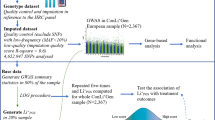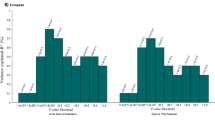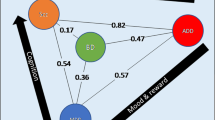Abstract
Several studies have indicated that patients with bipolar disorder (BD) who respond well to lithium prophylaxis constitute a biologically distinct subgroup. Lithium is thought to stablize mood by acting at the phosphoinositide cycle. We have investigated a polymorphism located in the gene (PLCG1) that codes for a γ-1 isozyme of phospholipase (PLC), an enzyme that plays an important role in the phosphoinositide second messenger system. A population-based association study and a family-based linkage study were carried out on patients who were considered excellent responders to lithium prophylaxis. Response to lithium was evaluated prospectively with an average follow-up of 14.4 ± 6.8 years. The PLCG1 polymorphism was investigated in 136 excellent lithium responders and 163 controls. In addition, the segregation of this marker was studied in 32 families ascertained through lithium-responsive bipolar probands. The allele distributions between lithium-responsive bipolar patients and controls were different, with a higher frequency of one of the PLCG1 polymorphisms in patients (χ2 = 8.09; empirical P = 0.033). This polymorphism, however, confers only a small risk (OR = 1.88, CI 1.19–3.00). Linkage studies with the same marker yielded modest support for the involvement of this gene in the pathogenesis of BD when unilineal families were considered (Max LOD = 1.45; empirical P = 0.004), but not in the whole sample. Our results provide preliminary evidence that a PLC isozyme may confer susceptibility to bipolar disorder, probably accounting for a fraction of the total genetic variance. Whether this polymorphism is implicated in the pathogenesis of BD or in the mechanism of lithium response remains to be determined.
This is a preview of subscription content, access via your institution
Access options
Subscribe to this journal
Receive 12 print issues and online access
$259.00 per year
only $21.58 per issue
Buy this article
- Purchase on Springer Link
- Instant access to full article PDF
Prices may be subject to local taxes which are calculated during checkout
Similar content being viewed by others
Author information
Authors and Affiliations
Corresponding author
Rights and permissions
About this article
Cite this article
Turecki, G., Grof, P., Cavazzoni, P. et al. Evidence for a role of phospholipase C-γ1 in the pathogenesis of bipolar disorder. Mol Psychiatry 3, 534–538 (1998). https://doi.org/10.1038/sj.mp.4000447
Received:
Revised:
Accepted:
Published:
Issue Date:
DOI: https://doi.org/10.1038/sj.mp.4000447
Keywords
This article is cited by
-
Differential characteristics of bipolar I and II disorders: a retrospective, cross-sectional evaluation of clinical features, illness course, and response to treatment
International Journal of Bipolar Disorders (2023)
-
Evolutionarily conserved gene expression patterns for affective disorders revealed using cross-species brain transcriptomic analyses in humans, rats and zebrafish
Scientific Reports (2022)
-
Excitatory and inhibitory synaptic dysfunction in mania: an emerging hypothesis from animal model studies
Experimental & Molecular Medicine (2018)
-
The Role of Pharmacogenomics in Bipolar Disorder: Moving Towards Precision Medicine
Molecular Diagnosis & Therapy (2018)
-
Isoform specific differences in phospholipase C beta 1 expression in the prefrontal cortex in schizophrenia and suicide
npj Schizophrenia (2017)



